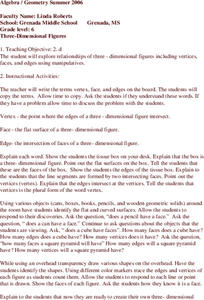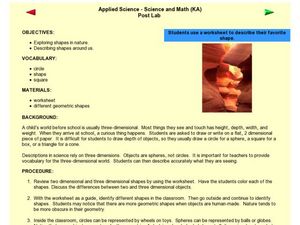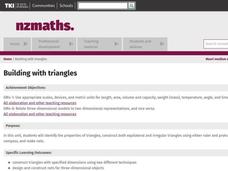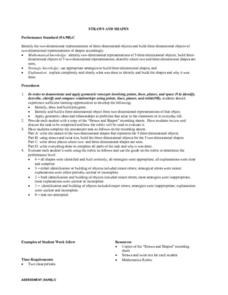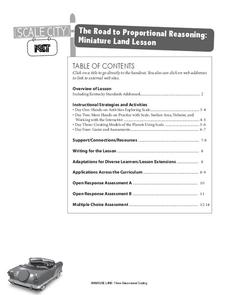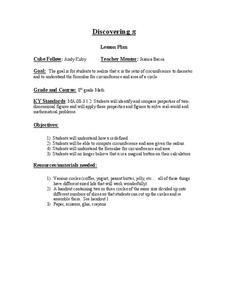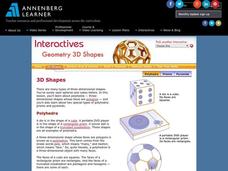Curated OER
Children's Museum of Houston - Pre/Post Classroom Activities - Nets
Students make three dimensional shapes with nets. For this nets lesson, students receive nets which they fold to make a three dimensional object. They predict what shape each net will make and verify it after making the net. They use the...
Curated OER
Three-Dimensional Figures
Sixth graders explore three-dimensional objects. Using various objects found in the classroom, they identify faces, edges, and vertices of objects. Students create their own objects. They describe the polydron, telling the faces,...
Mathematics Vision Project
Module 5: Modeling with Geometry
Solids come in many shapes and sizes. Using geometry, scholars create two-dimensional cross-sections of various three-dimensional objects. They develop the lesson further by finding the volume of solids. The module then shifts...
Curated OER
Applied Science: Exploring Shapes in Nature
Explore geometry with your young mathematicians! First, have them color in different two-dimensional and three-dimensional shapes. Then take them on a walk around the classroom. Can they identify different shapes using the target...
Curated OER
Building With Triangles
Fourth graders use two different techniques to construct triangles with specific dimensions. They determine how to construct nets for three-dimensional objects focusing on those made with equilateral triangles. They are able to name the...
Virginia Department of Education
Surface Area and Volume
Partners use materials to wrap three-dimensional objects to determine the formula for surface area. The groups use an orange to calculate the amount of peel it takes to completely cover the fruit. Using manipulatives, individuals then...
College Board
AP® Computer Science: A Picture Lab Student Guide
How do you modify digital pictures? In this lab learners write methods that modify digital pictures. They how to traverse a two-dimensional array of integers or objects, and are introduced to nested loops, binary numbers,...
Curated OER
What do two-dimensional tessellations look like? Where in art can they be found?
Young scholars explore the world of art and culture, including the works of M.C. Escher. They identify and create original tessellations. Students use a wealth of interactive multimedia applications. They explore the artistic...
Curated OER
Straws and Shapes
Students investigate the concepts related to observing two dimensional objects. They also build three dimensional objects using the two dimensional objects. The students give an oral or written explanation for how the pieces fit together...
Technical Sketching
Introduction — Surfaces and Edges
How different can 3-D and 2-D really be? An engineering resource provides an explanation about the importance of two-dimensional technical drawings. Several samples show how to create multi-view drawings from pictorials and...
Kentucky Educational Television
The Road to Proportional Reasoning
Just how big would it really be? Young mathematicians determine if different toys are proportional and if their scale is accurate. They solve problems relating scale along with volume and surface area using manipulatives. The...
EngageNY
Coordinates of Points in Space
Combine vectors and matrices to describe transformations in space. Class members create visual representations of the addition of ordered pairs to discover the resulting parallelogram. They also examine the graphical representation...
Charleston School District
Volume of Composite Shapes
It's the parts that make the whole. Learners apply volume formulas to composite figures to find the total volume of the figure. Previous lessons in this series taught the methods for finding the volume and/or dimensions of...
Curated OER
Making a desk organizer for students who are blind or visually impaired
Organization is of the utmost importance when teaching orientation and mobility to learners with visual impairments. To help keep everything in order and provide independence, use these instructions for making a desk organizer. The...
Curated OER
Squares to Compare
Students investigate how to draw and classify two and three dimensional figures (squares, triangles, rectangles.)
Curated OER
Guess My Shape
Students describe shapes to other students who have to guess that shape. In this shape lesson plan, students describe shape attributes to other students. Then those other students have to guess the shape that is being described to them....
Curated OER
Net "Working"
Upper elementary and middle schoolers explore the properties of various polygons. They use video, resource links, and engage in hands-on activities in order to construct geometric nets. This fine plan should lead to increased...
Curated OER
Symmetry and Geometric Shapes on Campus
Build on your learners' previous knowledge of geometric shapes and symmetrical figures. Then set them out to take photos of geometric shapes on campus. They assess whether the photos contain symmetry or not.
Curated OER
Discovering Pi
Students relate Pi to a circle. In this circles lesson, students identify the different properties of two dimensional objects. They relate Pi to the circumference, diameter and area of a circle .
Teach Engineering
Seeing All Sides: Orthographic Drawing
How can your draw three-dimensional figures on paper? The lesson shows pupils how to draw orthographic projections of three-dimensional figures composed of cubes. After viewing a PowerPoint presentation, they practice this skill with...
Star Date
Shadow Play
Three activities make up a solar system lesson that features the sun, its light, and the shadows it produces. Scholars step outside to discover the changes shadows make at different times of day, take part in a demonstration of...
Curated OER
Circles to Spheres
Students investigate circles and spheres. In this space shapes lesson, students compare and contrast two-dimensional and three-dimensional shapes. Students investigate the relationship between plane and space shapes.
Annenberg Foundation
Geometry 3D Shapes: 3D Shapes
Explore vocabulary related to three-dimensional shapes. An instructional website describes the characteristics of different geometric solids. Learners can use an interactive component to view nets, faces, vertices, and edges of common...
EngageNY
Truncated Cones
Learners examine objects and find their volumes using geometric formulas in the 21st installment of this 25-part module. Objects take the shape of truncated cones and pyramids, and individuals apply concepts of similar triangles to find...

